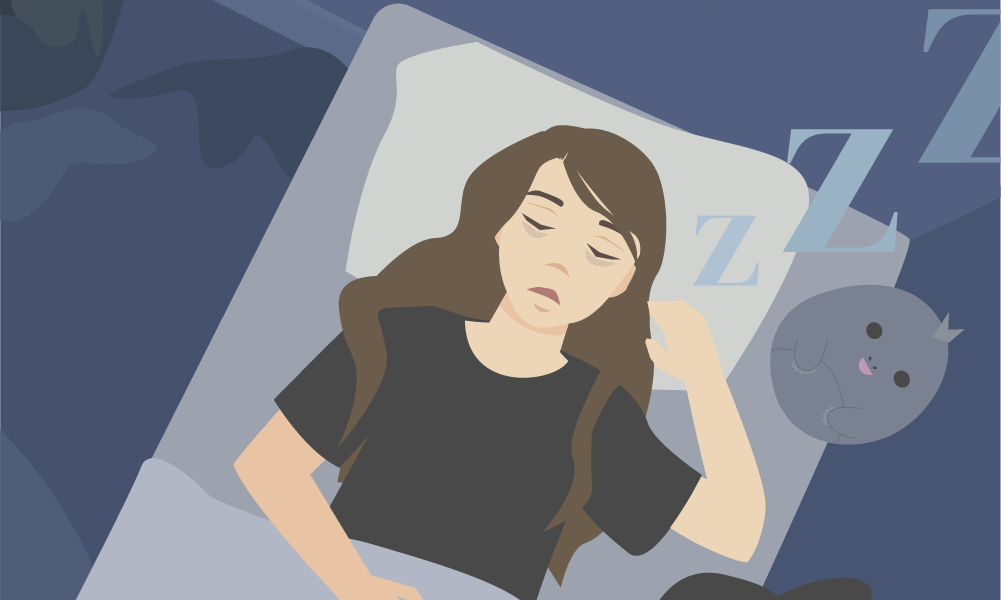Sleep plays a crucial role in the overall health and well-being of teenagers. While it is recommended that teens get at least 8 hours of sleep or more each night, many teens fall short of that goal. In 2022, only 43% of Cortland County 7-12th graders got the recommended hours of sleep or more on a typical school week. When people do not get enough sleep, they build up a “sleep debt” that is also known as sleep deprivation. Sleep deprivation can have significant effects on a teen’s mental health, physical health, school performance, and overall quality of life. 7-12th grade students in Cortland County who did not get enough sleep (40%) were twice as likely as students who did get enough sleep (18%) to report symptoms of depression. In this article, we will explore the causes and consequences of sleep deprivation among teens, and provide practical tips for both parents and teens to help prevent it.
Causes of Sleep Deprivation
Sleep deprivation can be caused by several different factors in teens:
- Hormonal Time Shift: Teenager’s internal clocks are naturally behind about 1-2 hours. Meaning, teens often don’t feel tired around a normal bedtime until 1-2 hours later. However, many school schedules often conflict with this, leading to “sleep debt”.
- Screen-Based Devices: The use of smartphones, TVs, laptops, and other electronic devices before bed can make it harder to fall asleep. The light from the devices entering through the eyes signals the brain that it is still “light” out, delaying the signals for sleep.
- Hectic After-School Schedules: It is easy to pack a schedule with homework, part-time work, sports, and social commitments, but it’s also easy to then leave not enough time for sleep.
- Leisure Activities: Leisure activities like watching TV, gaming, using smartphones, or working on laptops can interfere with sleep due to light exposure. However, these activities often stimulate the brain too much before sleeping, creating a restless brain.
- Social Attitude: Our culture will often value being the most active and productive all the time, over getting enough sleep.
- A Vicious Cycle: Insufficient sleep can lead to overactive brains, making it difficult to fall asleep.
- Sleep Disorders: Some conditions like restless leg syndrome or sleep apnea can affect sleep by either reducing time slept, and/or the quality of sleep.
Effects of Sleep Deprivation:
We know that there are negative effects to health from sleep deprivation, but let’s see what range it covers:
- Concentration difficulties including shortened attention span
- Memory problems
- Poor decision-making
- Risk-taking behavior
- Moodiness and aggression
- Depression
- Anxiety
- Reduced academic and sports performance
Sleep deprivation can hold deeper consequences for teens beyond feeling fatigued. Sleep deprivation can impair cognitive functions that make good decision making harder and leaves teens susceptible to impulsive choices. This compromised decision-making can lead to risky behaviors such as use of alcohol, marijuana, or tobacco to fall asleep. It’s important to understand that these substances don’t actually contribute to a true feeling of restfulness. Instead, they hinder the potential for quality sleep, fuelling the cycle of sleep deprivation and substance use. Cortland teens who did not get enough sleep were more than twice as likely than students who got enough sleep to report use of alcohol, marijuana, and cigarettes in the past 30 days.
Preventing Sleep Deprivation Tips for Teens:
There’s a lot that teens can do to take the lead in getting enough sleep each night. Here are some practical strategies to help promote a restful night’s sleep:
Create a relaxing bedtime routine for yourself. For example, start preparing for bed 1-2 hours before the time you plan to go to sleep. Maybe your routine includes a bath/shower, a calming cup of warm tea, journaling, or practicing other mindfulness techniques.
Doing the same bedtime routine every night for at least four weeks helps your brain associate this routine with going to sleep, making falling asleep easier.
Avoid stimulating snacks and drinks like coffee, soda, energy drinks, chocolate, candy, and caffeine at least an hour before bedtime.
Avoid stimulating activities such as screens from TVs, computers, phones, doing homework, or other activities that would get your mind racing at least an hour before bedtime.
Avoid other activities such as moderate or heavy exercising. For those looking for some light movement before bed, gentle yoga is a great activity to wind down the day.
Your brain sleep-wake cycle is largely set on light received through your eyes. Keeping your bedroom dark at night, and reducing screen time before bed, help signal to your brain that it is time to go to sleep.
Set a regular wake up time to keep up with the routines you are trying to create.
Try to keep the bed a space for sleeping! It is easier to fall asleep when the bed is associated with sleeping, and not the place where you work on homework. It is best practice to remove phones, laptops, and other technological devices from the bedroom before sleeping, as they could be distracting.
Avoid staying up late on weekends! Late nights can undo your sleep schedules, making going back to school on Monday even harder.
What Can Parents Do to Help Their Teens Get Sleep?
One of the easiest things parents can do to ensure their kids get the recommended sleep is to let them sleep in on the weekends. Not necessarily until the midafternoon, but even just 30 minutes of extra sleep on a regular basis can make a difference.
Stay consistent with bedtimes. Try to make sure they go to bed as close as possible to the same time each night to gain a total of 8 hours of sleep or more. This should stay consistent on weekends too.
Encouraging turning in early on Sunday nights. Making Sunday a late night means making the early start on Monday a fight to wake up and beat the drowsiness.
Sit down with your teen to plan their after school schedules together, and help them set clear and realistic expectations for their time.
Coordinate to make mornings easier. Prompting your child to get ready for the morning by laying out clothes, packing bookbags, or getting lunch made for the next day could mean they could sleep in a few more minutes.
Avoid scheduling early morning appointments, classes, or training sessions for your teen if possible, to ensure getting the most sleep possible.
Encourage sleep friendly food habits in the home by limiting stimulating drinks and snacks an hour before bed such as coffee, chocolate, soda, and energy drinks.
It is recommended practice to remove all technology from bedrooms at night. Try encouraging your teens to charge their phones outside of their rooms.
The best thing a parent can do to help their teen sleep is modeling good sleep practices yourself. When your teen sees you put time and effort into getting the recommended sleep, you are giving them a blueprint to follow for themselves.
Sources:
Cortland Area Communities That Care (CACTC). Results and Analysis: The 2022 Cortland County Youth Survey. https://www.cortlandareactc.org/publications. February 2023.
Better Health Channel. (2018). Teenagers and sleep. Retrieved from https://www.betterhealth.vic.gov.au/health/healthyliving/teenagers-and-sleep. (Accessed August 14, 2023)
Child Mind Institute. (2023). How to help teenagers get enough sleep. Retrieved from https://childmind.org/article/help-teenagers-get-sleep/
National Sleep Foundation. (2023). Teens and sleep. Retrieved from https://www.sleepfoundation.org/teens-and-sleep. (Accessed August 14, 2023)



